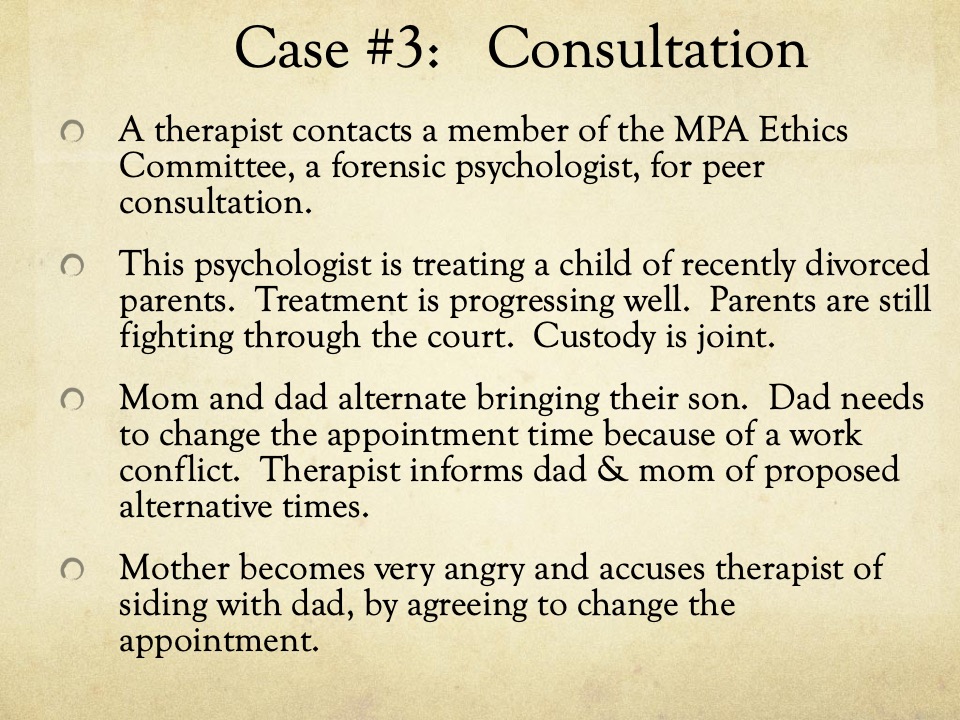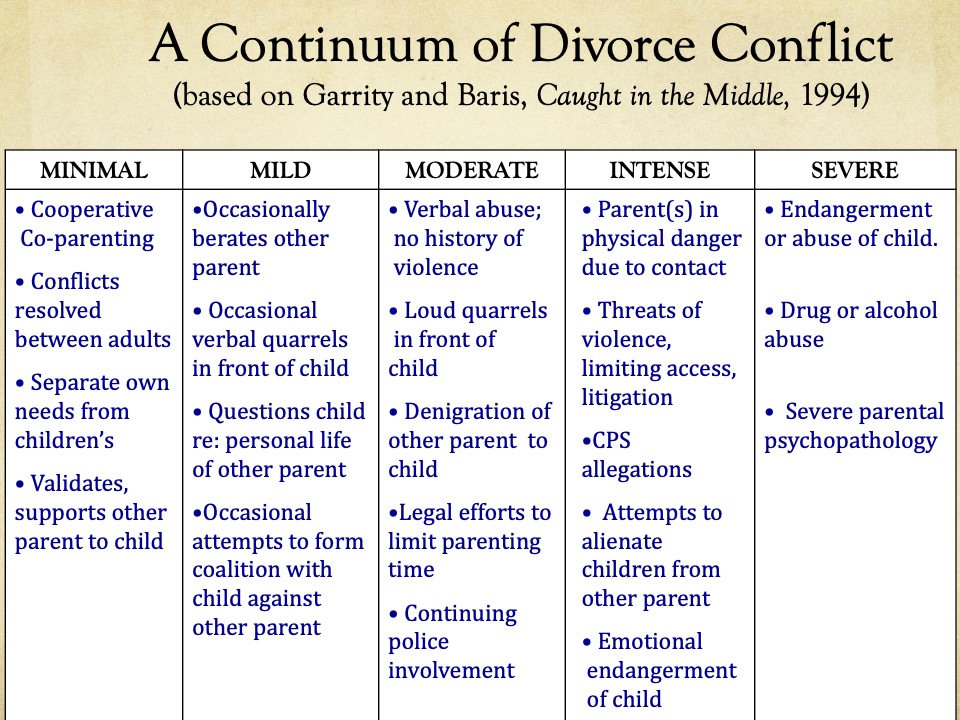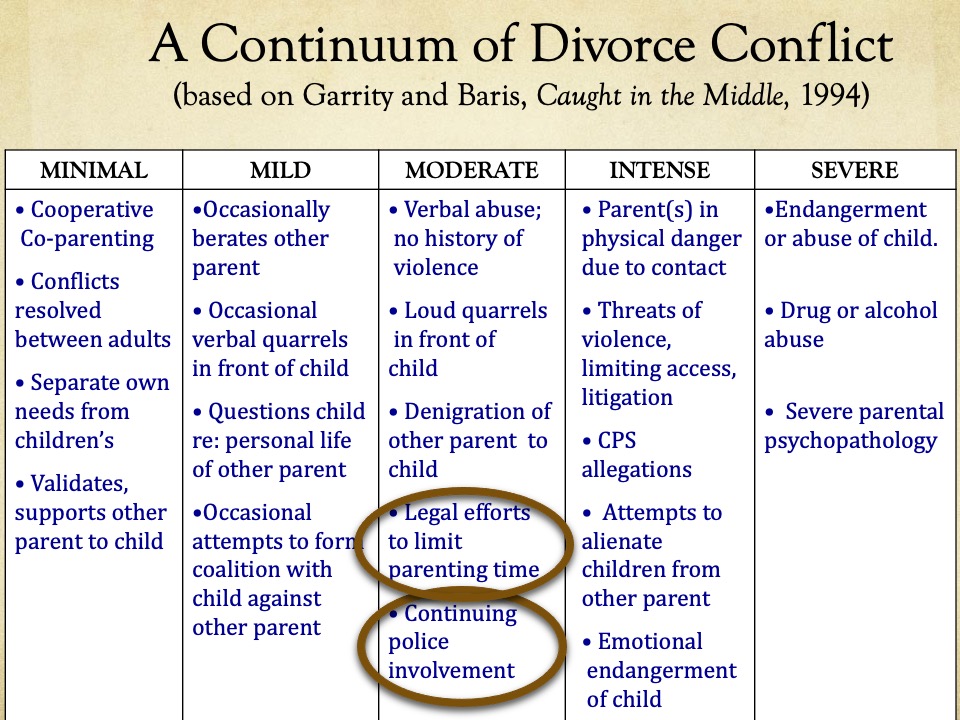Case 3:

A therapist contacts me in my former capacity a member of the MPA Ethics Committee: This CIT is treating a 10 year old child of recently divorced parents. He is the 3rd therapist in as many years. He believes that mom terminated the last two therapies.
Treatment was progressing well. But the Parents are still fighting through the court. Custody is joint.
A parenting coordinator, appointed by the court, resigned, stating that there was too much bitterness. Previously dad took the child out of state, and although mom had been informed, she called the police.
There have been two occasions where the parents got into an argument in front of the child, in the waiting room after a therapy session– the child told the CIT.
Mom and dad alternate bringing their son. Dad needs to change the appointment time because of a course he needs to take for work. Therapist is busy, but informs dad & mom of proposed alternative times. Dad picks a later time. Mom insists on the time not changing; the therapist tries to get an agreement, Mother becomes very angry and accuses therapist of siding with dad, by agreeing to change the appointment. “I’m gonna find another therapist…”
Dad schedules an appointment. Mom shows up, insists it is her parenting time, and says she will take the child home.
The boy asks for 5 minutes with the therapist. The mother refuses. The boy gives the therapist a note, which says: “I want to live with my father.” Later, the boy calls from mother’s cell phone: “Dad told me to write the letter, dad and I wrote it.” He sounds very scared.
The CIT said he believes that mother suffers from Borderline Personality Disorder.
A Continuum of Divorce Conflict
One way of looking at this case is in comparison with other cases. Garrity and Baris, in their book Caught in the Middle (1997) described a continuum of divorce related conflict; I have added to the details of the levels of conflict, from Minimal to Severe, described by them:

At the low end of this scale, labeled Minimal Conflict, the children’s needs are paramount, and the children are separated from their parents relationship problems. The parents support another. This is where we hope parents to be; and this level of cooperation is what we expect when joint custody is considered.
The high end of the scale is characterized by physical endangerment to the child, physical or sexual abuse, substance abuse, and mental illness on the part of one or more parents. Clearly, protection of the child is an urgent objective at this level. Children at this level are often psychologically (or physically) traumatized.
Even mild Conflict, as defined by this scale, is harmful. At this level it is important to distinguish the acute conflict characterizing especially the first year after filing and chronic conflict which endures over the long term.
At the moderate level of conflict, the child is exposed to verbal abuse or loud quarrels, parents badmouthing the other parent to the child, or continuing legal efforts to deny parenting time
CIT’s often become partisans for one of the parents at this level of conflict and above, according to research by Janet Johnston and her colleagues.
Violence or abuse between the parents, threats of violence, unsubstanitated abuse alegations, programs of alienation or other forms of emotional endangerment indicate a higher level of conflict. Some kind of abuse allegation appears to occur much more frequently than one might assume. In Depner’s study of mediated divorce cases physical abuse of the child was alleged in 18 % of cases, sexual abuse in 8 %.
In this case:

The CIT considers writing to the Judge, saying that mother’s decision to end therapy is potentially harmful to the child, and that custody should be changed to father. Therapist consults with two psychologists, both forensic psychologists, one a member of the MPA Ethics Committee.
The CIT wants to know:
Can I see the child, against mom’s objection?
Can I see the child on father’s time?
If he does, what could the mom do, what is the risk to him?
Consent-a legal and ethical issue. He asks”
Should I write a letter to the judge?
The mother seems quite disturbed, he feels.
What ethical principles are involved?
What are the alternative courses of action for the therapist?
What should the consultant recommend to the therapist? My suggestion:
I. A letter to mother, copy to father, expressing:
1) A desire to meet;
2) Child needs treatment
II. Father can petition the court to order child back into treatment with the psychologist. The psychologist can say that treatment should continue
He can not comment on the parents, except to say that mom terminated treatment and the dad wants to continue.